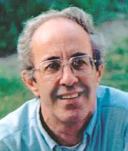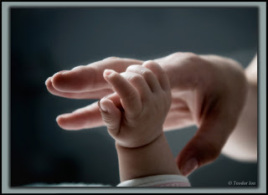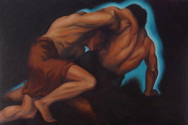In the First Reading from the Old Testament, Job describes the misery of the human condition when he laments that his life is filled with “drudgery.” Job feels trapped (“as a slave”) and is “without hope.”
The Gospel describes the condition of the people who came to Jesus for healing. They felt trapped - politically, militarily, socially, economically and physically.
But Jesus overturns the human condition. First He brings hope. Then He brings healing, then - and now.
So let’s look at:
- Three levels of hope
- What we need - as people - to achieve hope at each level
- What we need to do as a community in order for that hope to be offered by the community - and received by others.
Level 1
First - let’s start with the fact that, as I mentioned in the bulletin this week and last week, every person is on a faith journey. From Mother Theresa to the most die hard atheist like Christopher Hitchens or Richard Dawkins, every person is somewhere along a spiritual growth/spiritual maturity continuum moving from Trust - to Curiosity - to Spiritual Openness - to Spiritual Searching - to Discipleship.
The second point deals with the relationship between “touch” and “hope.” Scripture scholar Joyce Ann Zimmerman relates hope to the experience of a sick child. The child instinctively seeks the touch of a loving parent; he or she wants the parent to sit by the bed; to be near. Even as adults, when we are ill or down-and-out, we seek comfort from a trusted and caring other who grasps our hand: As the gospel illustrates, in times of trouble we need the personal touch and presence of another. So “touch” is very important in providing hope to another person.
Third point: Pope Francis has challenged us to become a “field hospital” in the midst of the neighborhood. This does NOT happen primarily at St. Monica Church. This happens PRIMARILY at TE Middle School, Conestoga High School, Malvern Prep, Eagle and St. Norbert School. OR it happens at the soccer, football, baseball, lacrosse field, dance hall and swimming pool.
Now, let us connect the dots. When you meet people in the beginning of the spiritual continuum - moving from “trust” through “curiosity” for example, these are people who are taking a chance on us when they come us one-on-one or when they come to St. Monica. The studies show that they are not looking for theology. They’re not looking for Bible studies or youth group. They come in looking to see if anyone simply notices them. Do we see them or are they invisible? That’s want they really want, simply to be recognized and noticed.
What’s the call of the community to provide hope to the people in the beginning of their spiritual journey? “Hey, you’re new. WHO are you? What’s your name? Let me introduce myself.”
It’s about “The touch,” especially that first physical touch and, for people who are just starting, this is HUGH! They might be coming from a place where they seemed alone, anonymous. That someone acknowledges them, signifies that they are someone, that they have worth.
There is a story in the book “Report to Greco” by author Nikos Kazantzakis
At age 19 years old, Nikos spent a summer at a monastery in Greece. At this monastery, there was a famous old monk called Father Makarios. One day, Nikos asked Father Makarios,
“Do you still wrestle with the devil?”
Father Makarios said, “No. I used to wrestle with the devil all the time. But now I have grown old and tired, and the devil has grown old and tired with me. So I leave him alone - and he leaves me alone.”
Nikos asked, “Then life is easy now?”
Father Makarios responded, “Oh, no. Life is much harder now. For now I wrestle with God.”
Nikos exclaimed, “You wrestle with God and hope to win?”
“No,” said Father Makarios, “I wrestle with God and hope to lose.”
The word, “Israel” means “to wrestle with God.” See the story about Jacob in Genesis 32:22-31. There are people who are not as desperate for hope as the person in our first example. They may be getting along fine in their lives, good grades, a respectable level of popularity, healthy. They may be facing substantial difficulties. What challenges them the most is not wrestling with the difficulties, but wrestling with God. They are “Israel.” All of us who take the spiritual life seriously will come to this point at some time. Our mind constantly questions the Almighty about who He is, what He is, what He is about and what He is doing in our life.
In his treatise, “On Spiritual Perfection” by Bishop Diadochus of Photice, he writes,
[W]e must maintain great stillness of mind, even in the midst of our struggles. We shall then be able to distinguish between the different types of thoughts that come to us:
- Those that are good, those sent by God, we will treasure in our memory;
- Those that are evil and inspired by the devil we will reject.
A comparison with the sea may help us. A tranquil sea allows the fisherman to gaze right to its depths. No fish can hide there and escape his sight. The stormy sea, however, becomes murky when it is agitated by the winds. The very depths that it revealed in its placidness, the sea now hides. The skills of the fisherman are useless.
People in this phase of spiritual growth are like the monk, Fr. Makarios. The key is not the struggle. The solution is NOT to struggle. The solution is to surrender, to let go, to give up.
Young lives are busy. (Personal opinion: too busy! Way too much activity, way too little qui et). To struggle, to question, to engage in one activity after another - looking for answers is simply to stir and muddy the waters. This is NOT where hope resides. The “fisherman” can’t see you. If He can’t see you, He can’t reach you. If He can’t reach you, He can’t help you. If He can’t help you, He can’t save you either.
et). To struggle, to question, to engage in one activity after another - looking for answers is simply to stir and muddy the waters. This is NOT where hope resides. The “fisherman” can’t see you. If He can’t see you, He can’t reach you. If He can’t reach you, He can’t help you. If He can’t help you, He can’t save you either.
Level 3
You are NOT an accident. You are NOT time + matter + chance. You’re special. You were created “on purpose.” You have a reason for being. You have a mission.
The mission gets “figured out” through a number of channels:
- Your family and friends
- Your successes and your failures
- Your wants vs. your needs
- Your hopes and your dreams
You primary channel for “figuring it out” however, must be the Lord and the “user manuals” that He provides.
Happy indeed are those who delight in the law of the Lord and who ponders his law day and night.
You will be like a tree that is planted beside the flowing waters, that yields its fruit in due season and whose leaves shall never fade; and all that you do shall prosper. (Psalm 1)
To figure it out, you need quiet time. You need conversation time with God. He’s already speaking with you but you can’t hear him if you are so active chasing answers and hoping to achieve all that you wish for. That’s not hope.
I close with Henri J.M. Nouwen. He was a Dutch-born Catholic priest, professor and popular writer on pastoral ministry, spirituality, social justice, psych ology and community.
ology and community.
He wrote:
I have found it very important in my own life to try to let go of my wishes - and instead to live in hope. I am finding that when I choose to let go of my sometimes petty and superficial wishes, and trust that my life is indeed precious and meaningful in the eyes of God, something really new, something beyond my own expectations - begins to happen to me.
******************
Audio version of the homily is here:


